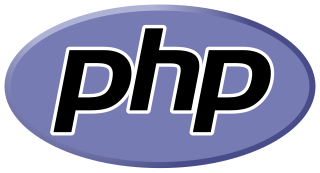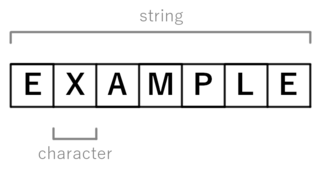
Common Lisp (CL) is a dialect of the Lisp programming language, published in American National Standards Institute (ANSI) standard document ANSI INCITS 226-1994 (S2018). The Common Lisp HyperSpec, a hyperlinked HTML version, has been derived from the ANSI Common Lisp standard.

JavaScript, often abbreviated as JS, is a programming language and core technology of the Web, alongside HTML and CSS. 99% of websites use JavaScript on the client side for webpage behavior.

PHP is a general-purpose scripting language geared towards web development. It was originally created by Danish-Canadian programmer Rasmus Lerdorf in 1993 and released in 1995. The PHP reference implementation is now produced by the PHP Group. PHP was originally an abbreviation of Personal Home Page, but it now stands for the recursive acronym PHP: Hypertext Preprocessor.

In computer programming, a string is traditionally a sequence of characters, either as a literal constant or as some kind of variable. The latter may allow its elements to be mutated and the length changed, or it may be fixed. A string is generally considered as a data type and is often implemented as an array data structure of bytes that stores a sequence of elements, typically characters, using some character encoding. String may also denote more general arrays or other sequence data types and structures.

Extensible Markup Language (XML) is a markup language and file format for storing, transmitting, and reconstructing data. It defines a set of rules for encoding documents in a format that is both human-readable and machine-readable. The World Wide Web Consortium's XML 1.0 Specification of 1998 and several other related specifications—all of them free open standards—define XML.
XSLT is a language originally designed for transforming XML documents into other XML documents, or other formats such as HTML for web pages, plain text, or XSL Formatting Objects. These formats can be subsequently converted to formats such as PDF, PostScript, and PNG. Support for JSON and plain-text transformation was added in later updates to the XSLT 1.0 specification.

In computer science, a library is a collection of resources that is leveraged during software development to implement a computer program.

glob is a libc function for globbing, which is the archetypal use of pattern matching against the names in a filesystem directory such that a name pattern is expanded into a list of names matching that pattern. Although globbing may now refer to glob -style pattern matching of any string, not just expansion into a list of filesystem names, the original meaning of the term is still widespread.
XSL-FO is a markup language for XML document formatting that is most often used to generate PDF files. XSL-FO is part of XSL, a set of W3C technologies designed for the transformation and formatting of XML data. The other parts of XSL are XSLT and XPath. Version 1.1 of XSL-FO was published in 2006.
A bit array is an array data structure that compactly stores bits. It can be used to implement a simple set data structure. A bit array is effective at exploiting bit-level parallelism in hardware to perform operations quickly. A typical bit array stores kw bits, where w is the number of bits in the unit of storage, such as a byte or word, and k is some nonnegative integer. If w does not divide the number of bits to be stored, some space is wasted due to internal fragmentation.
C++ Technical Report 1 (TR1) is the common name for ISO/IEC TR 19768, C++ Library Extensions, which is a document that proposed additions to the C++ standard library for the C++03 language standard. The additions include regular expressions, smart pointers, hash tables, and random number generators. TR1 was not a standard itself, but rather a draft document. However, most of its proposals became part of the later official standard, C++11. Before C++11 was standardized, vendors used this document as a guide to create extensions. The report's goal was "to build more widespread existing practice for an expanded C++ standard library".
String functions are used in computer programming languages to manipulate a string or query information about a string.

The syntax of the Python programming language is the set of rules that defines how a Python program will be written and interpreted. The Python language has many similarities to Perl, C, and Java. However, there are some definite differences between the languages. It supports multiple programming paradigms, including structured, object-oriented programming, and functional programming, and boasts a dynamic type system and automatic memory management.

The Oxygen XML Editor is a multi-platform XML editor, XSLT/XQuery debugger and profiler with Unicode support. It is a Java application so it can run in Windows, Mac OS X, and Linux. It also has a version that can run as an Eclipse plugin.
libxslt is the XSLT C library developed for the GNOME project. It provides an implementation of XSLT 1.0, plus most of the EXSLT set of processor-portable extensions functions and some of Saxon's evaluate and expressions extensions. libxslt is based on libxml2, which it uses for XML parsing, tree manipulation and XPath support. It is free software released under the MIT License and can be reused in commercial applications.
XPath is an expression language designed to support the query or transformation of XML documents. It was defined by the World Wide Web Consortium (W3C) in 1999, and can be used to compute values from the content of an XML document. Support for XPath exists in applications that support XML, such as web browsers, and many programming languages.
XQuery is a query and functional programming language that queries and transforms collections of structured and unstructured data, usually in the form of XML, text and with vendor-specific extensions for other data formats. The language is developed by the XML Query working group of the W3C. The work is closely coordinated with the development of XSLT by the XSL Working Group; the two groups share responsibility for XPath, which is a subset of XQuery.
The structure of the Perl programming language encompasses both the syntactical rules of the language and the general ways in which programs are organized. Perl's design philosophy is expressed in the commonly cited motto "there's more than one way to do it". As a multi-paradigm, dynamically typed language, Perl allows a great degree of flexibility in program design. Perl also encourages modularization; this has been attributed to the component-based design structure of its Unix roots, and is responsible for the size of the CPAN archive, a community-maintained repository of more than 100,000 modules.
Tcl is a high-level, general-purpose, interpreted, dynamic programming language. It was designed with the goal of being very simple but powerful. Tcl casts everything into the mold of a command, even programming constructs like variable assignment and procedure definition. Tcl supports multiple programming paradigms, including object-oriented, imperative, functional, and procedural styles.

The Standard Libraries are a set of libraries included in the Common Language Infrastructure (CLI) in order to encapsulate many common functions, such as file reading and writing, XML document manipulation, exception handling, application globalization, network communication, threading, and reflection, which makes the programmer's job easier. It is much larger in scope than standard libraries for most other languages, including C++, and is comparable in scope and coverage to the standard libraries of Java.









